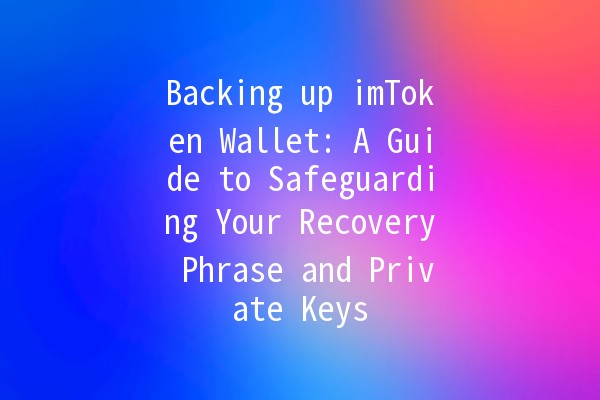In the world of cryptocurrencies, personal responsibility for assets is paramount. Cryptocurrency wallets, such as imToken, provide users with a means to manage their digital currencies securely. However, the key to this security lies in the proper handling of recovery phrases and private keys. Understanding these elements is crucial, as losing this information can lead to irrevocable loss of access to your funds.
A recovery phrase, also known as a seed phrase, is a series of words generated by your wallet that allows you to restore your account. It is the master key to your cryptocurrency investments. For imToken users, this phrase can typically be composed of 12 to 24 words. It's foundational for regaining access to your wallet in case your device is lost, stolen, or if the app is uninstalled.
Private keys are unique cryptographic keys associated with your cryptocurrency addresses. They allow you to spend the cryptocurrency stored at that address. In the case of imToken, each asset you hold has a corresponding private key. Like the recovery phrase, losing your private keys means losing access to your assets.
Explanation: The most traditional way to back up your recovery phrase and private key is by writing them down on paper.

Application Example: Once you set up your imToken wallet and receive your recovery phrase, write it down on a piece of paper. Make sure to store this paper in a secure location, such as a safe or a locked drawer. Avoid digital formats (like notes apps) to prevent potential hacking.
Explanation: Hardware wallets add an additional layer of security by keeping your private keys offline.
Application Example: If investing significantly in cryptocurrencies, consider purchasing a hardware wallet, like Trezor or Ledger. When setting it up, you'll be prompted to transfer your recovery phrase and private keys securely onto the device. This way, even if your phone is compromised, your assets remain safe.
Explanation: Relying on a single backup method can be risky. Creating multiple backups can be extremely beneficial.
Application Example: Alongside your first written copy of the recovery phrase, create additional copies and store them in different locations. Perhaps one in a safety deposit box at a bank, another with a trustworthy family member, and consider using fireproof containers for extra security.
Explanation: If you want to keep a digital version of your recovery phrase or keys, ensure it is encrypted.
Application Example: Use a password manager with encryption capabilities to store your recovery phrase safely. Examples include LastPass or Bitwarden. When using this method, always enable twofactor authentication (2FA) for added security.
Explanation: A backup is only as good as its effectiveness. Regularly testing it ensures that it works when you need it.
Application Example: Every few months, attempt to restore your wallet using your recovery phrase or private key on another device. This practice ensures that your backup method works and reminds you of its location.
While backups protect your recovery phrase and private keys, twofactor authentication (2FA) is another layer of security worth considering. Coupling your wallet with 2FA protects against unauthorized access.
Phishing scams are rampant in the cryptocurrency space. Always verify URLs and be wary of unsolicited communications requesting your recovery information. Always ensure you are using the official imToken app or website.
If you lose your recovery phrase, unfortunately, there is no method to recover your wallet without it. It's imperative to store this phrase safely from the outset. If it’s lost, consider it a lesson learned, and always utilize multiple backup strategies moving forward.
Yes, imToken allows users to export their private keys. However, exercise caution. Exporting your private keys and storing them in unencrypted formats can expose you to risks. It’s advisable to use hardware wallets for peace of mind.
No, it is not safe to share your recovery phrase with anyone. This phrase grants complete access to your wallet, and sharing it opens you up to potentially losing your funds.
If you forget your wallet password, you can still access your assets using your recovery phrase. Make sure to keep it secure and stored away safely, as it is your lifeline in such situations.
Each time you make significant changes to your wallet, such as adding new assets, it’s wise to back up your wallet again. Changes may affect data integrity, so keeping an updated backup can be beneficial.
Failure to back up your wallet may lead to permanent loss of access to your cryptocurrencies. Protecting your recovery phrase and private keys is essential for maintaining access to your digital assets.
By following these best practices and tips, you can ensure that your imToken wallet remains secure, and your assets are wellprotected from unforeseen events. Always remember, your security is ultimately in your hands.